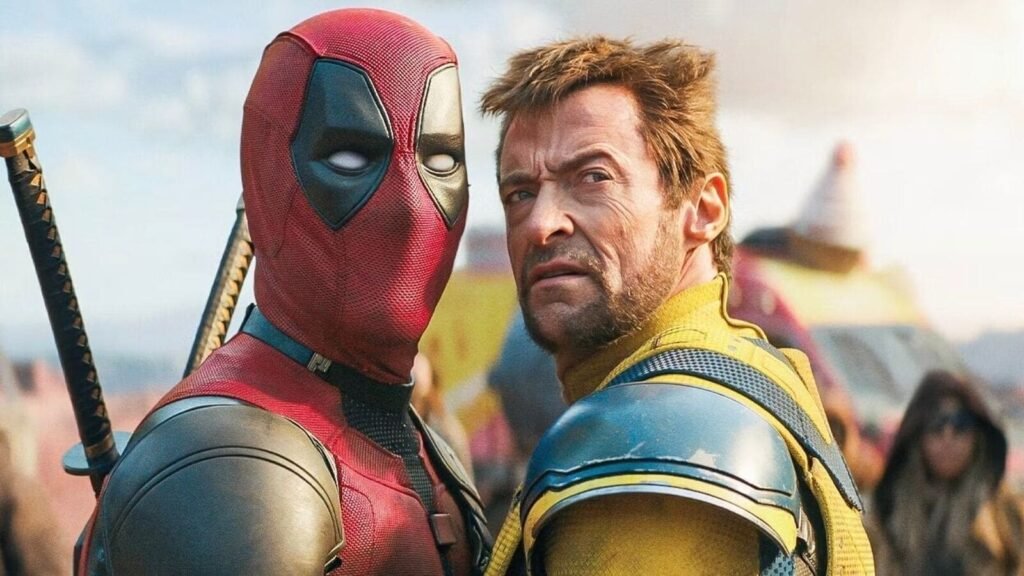What is the most surprising thing about the new Marvel film, “Deadpool & Wolverine”, the first to be rated R? It is not the violence, which is gratuitous and unpleasantly tinged with sexuality (suffice to say that Wolverine’s claws go where no claws should). Instead, it may be the synopsis, which Disney released beforehand. This starts by explaining how the hero, Deadpool, must save the world against “an existential threat” then suddenly tails off. “Fuck,” it says. “Fuck. Synopses are so fucking stupid.”
Perhaps that is because any synopsis of this film would involve terms like “space-time matrix” and “man in a red body stocking”. But “Deadpool & Wolverine”, as a commercial venture, is not stupid at all. The film, which breaks taboos and the fourth wall with abandon, is startlingly successful: it made $211m during its first weekend (July 26th-28th) in America. That is the largest-ever opening for an R-rated film and the sixth-biggest grossing—the word is unusually apt—opening of all time.
Deadpool the character may save the world; “Deadpool” the film is being credited with saving the Marvel film franchise itself. (Whether or not it was culturally worth saving is arguable.) Recent films have bombed, but the Marvel enterprise—which sells comics, merchandise and music in addition to films—remains a marvel. The largest continuous, self-contained piece of fiction that humanity has produced is not the writings of Proust, or of James Joyce, but of Marvel comics: over half a million pages to date, and counting. The franchise, as Douglas Wolk, author of “All of the Marvels”, has argued, changed the filmography of the 20th century both directly (three of the ten highest-grossing films of all time are Marvel films) and indirectly. “Star Wars’ and ‘Avatar’ and ‘The Matrix’”, writes Mr Wolk, “would be unimaginable without it.”
Its influence goes beyond film. Phrases such as “‘nuff said” and “Spidey sense” came from Marvel. In 2022 Marvel Comics were issued as Penguin Classics, implicitly ranking them alongside the complete works of Jane Austen and Homer. They share some similarities with the latter (endless fighting, odd obsession with body armour), though not style. In “The Iliad”, after Achilles defeats his foe, he speaks movingly about “the fate the gods have spun for poor mortal men, that we should live in misery”. When Marvel characters win, they tend instead to say things in the vein of “Pow!” and “You skunk!”
Marvel’s success was not always easy to predict. The characters, who first appeared in the 1930s during comic books’ “golden age”, included the Human Torch and Captain America. They battled villainous foreigners and the English language itself. (“Quick! Load the sleep-gas cylinder in your portable bazooka!” is a typical sentence.) There was some zeal—the debut issue of Marvel Comics sold 800,000 copies—but also scepticism. As Martin Goodman, Marvel’s publisher put it, “We can’t keep putting out this crap for long.”
It turns out that they could, though not all of Marvel’s habits have aged well in a more global world. In a “Captain America” film, the Cap bumps into some Frenchmen in wartime Europe; their ongoing discussion is rendered in the subtitles simply by the words: “Speaking French”. Not all of its names have aged well, either: the tendency to shorten Captain America’s name to “the Cap”, to modern British ears, will always make him sound as though he is battling not evil but rather unwanted pregnancies with a diaphragm.
Instead of elevating its films, Marvel seems to have chosen to mock itself in relentless, self-referential irony. The opening credits of the first Deadpool film promised a “hot chick”, “British villain” and “gratuitous cameo”. The latest is filled with in-jokes about the rights to the Marvel characters themselves, and at one point the two characters tussle by a 20th-Century Fox logo that is half-buried, Ozymandias-like, in desert sands.
“Deadpool & Wolverine” often feels like little more than a series of cameos glued together with bodily fluids, albeit by good actors. Matthew MacFadyen from “Succession” pops up here as a British bad guy to warn another villain that she “has the power to shred the fabric of all realities”. Then he looks glum, possibly because he is worried about reality, or possibly because he has just said the line “shred the fabric of all realities”. At one point, Deadpool turns to Wolverine and says: “Welcome to the MCU [Marvel Cinematic Universe], by the way. You’re joining at a bit of a low-point.” Financially, thanks to this film, he may not be.
© 2023, The Economist Newspaper Limited. All rights reserved. From The Economist, published under licence. The original content can be found on www.economist.com

